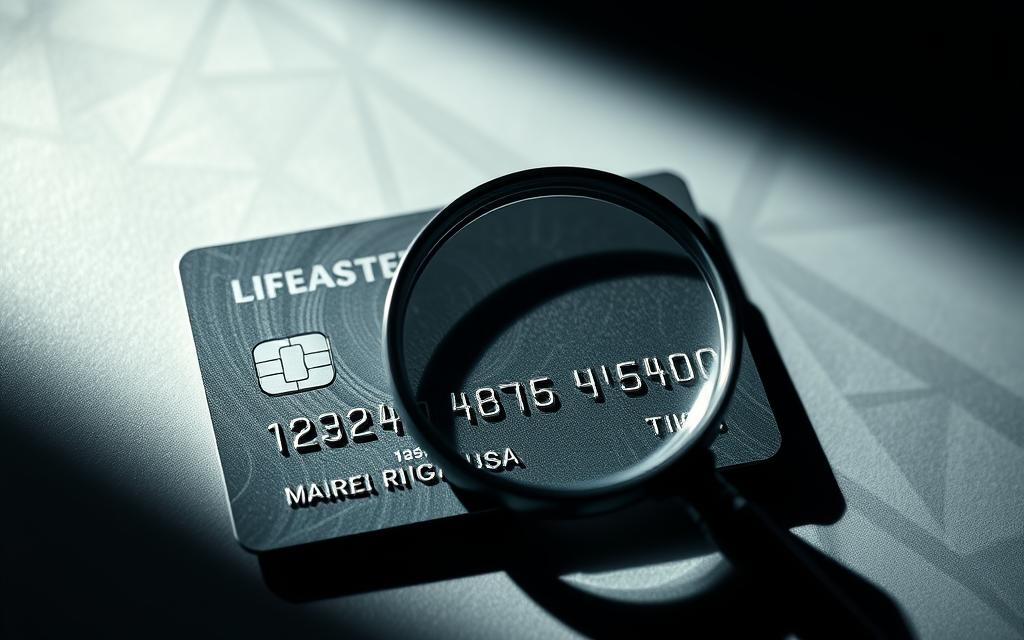Advertisement
Are you unknowingly throwing money away due to common financial errors with your plastic money? A recent study found that millions in the United States make costly financial blunders daily.
These costly errors can be simple oversights or complex financial traps. Knowing the most common financial missteps helps you save money. It also makes the most of your financial tools.
Let’s look at the most common pitfalls and how to avoid them. This way, you can use your financial resources wisely without falling into credit card mistakes.
Not Understanding Your Fees
It’s key to know the fees on your credit card to avoid money troubles. Credit card fees can be tricky and different. So, it’s important to understand them well to manage your money right.

Annual Fees Explained
Many credit cards have annual fees, from a few dollars to hundreds. It’s vital to know what you get for this fee. Some cards offer great rewards, travel perks, or special services that might be worth the cost. But, if you don’t use these benefits, you’re losing money.
For example, a card with a $100 annual fee might give you $120 in travel credits or special rewards. If you use the card smartly, the benefits can be more than the fee. But, if you don’t use these perks, you’re losing $100 each year.
Late Payment Fees
Late payment fees can be high, up to $38 per missed payment. Setting up automatic payments can help avoid these fees. It’s also important to know your card’s grace period and payment due dates to pay on time.
“The key to avoiding late fees is staying on top of your payment schedule. Automating your payments can save you from unnecessary charges.”
Some credit card issuers offer programs or waivers for late fees. If you get a late fee, it’s worth asking your issuer for a waiver.
Foreign Transaction Fees
Foreign transaction fees can add up fast, mainly for those who travel a lot. Some cards charge up to 3% of each transaction abroad. Knowing these fees helps pick the right card for travel.
For instance, if you spend $1,000 in Europe, a 3% foreign transaction fee adds $30. Cards with no foreign transaction fees are best for international travel, saving you money on every buy.
Ignoring Your Credit Score
Credit scores are key to your financial health. Ignoring them can cost you a lot. A good score can lead to better loan rates and lower fees. It can even help you get a rental or a job.
Impact of Credit Utilization
Credit utilization is how much of your credit you use. Using too much can hurt your score. It shows lenders you might be spending too much.
To keep a good score, use less than 30% of your available credit. Here are some tips:
- Keep your credit card balances low.
- Use less than 30% of your available credit.
- Check your credit reports often for errors.
How Payment History Affects Scores
Payment history is very important for your score. Late payments and bankruptcies can lower it a lot. But, making payments on time can help your score.
- Use reminders to pay on time.
- Automate your payments to avoid missing them.
- Fix any past due accounts quickly to avoid more damage.
By controlling your credit use and paying on time, you can avoid mistakes. This will help your financial health a lot.
Carrying a Balance Month-to-Month
Carrying a credit card balance month after month is very costly. It can lead to a lot of debt because of interest rates and finance charges. It’s important to know how carrying a balance affects your credit card debt.
Carrying a balance means you’re paying for the items you bought and also for borrowing money. This can quickly increase your debt. For example, a $2,000 balance on a 20% interest rate credit card can cost you hundreds of dollars extra each year in interest.
Interest Rates and Finance Charges
Interest rates on credit cards vary a lot, and finance charges can be tricky. It’s key to understand how these rates work and how they affect your debt. Credit card companies often charge interest daily, which can be compounded monthly. This means you pay interest on the interest, making your debt grow fast.
To avoid this, read your credit card agreement carefully. Know the terms about interest rates and finance charges. Some credit cards offer low rates for a while, but it’s important to know when these rates end and what the new rates will be.
Long-Term Financial Consequences
Carrying a balance can have long-term effects on your finances. It can hurt your credit score because of high credit utilization. Also, the longer you take to pay off your debt, the more you’ll pay due to interest.
To avoid these problems, consider consolidating your debt to a lower-interest credit card or a personal loan. Making a budget and focusing on paying off your debt can also help you control your finances.
Understanding the risks of carrying a credit card balance and managing your debt well can prevent a common mistake. Good credit card management is essential for a healthy financial life.
Missing Out on Rewards
Getting the most from your credit card rewards can really boost your finances. It’s key to know how to use your card’s rewards program well.
Credit card rewards include cashback, points, and travel miles. Cashback rewards give you a percentage of your spending back. Points and miles can be used for travel, merchandise, or other rewards, but they might need more effort to get the most value.
How to Maximize Cashback
To get the most from cashback rewards, try these tips:
- Choose a credit card with a high cashback rate in your spending areas, like groceries or gas.
- Look out for rotating categories or special deals that offer more cashback for a short time.
- Always pay your balance in full to avoid interest charges that can eat into your cashback.
Points vs. Cash Benefits
Deciding between points and cash rewards depends on your needs and goals. Cashback rewards are easy and flexible, letting you use your rewards as you wish. Points and miles can be more valuable if used wisely, like for travel or upgrades.
Think about your spending and how you like to use rewards to choose the best option. Some cards offer both cashback and points, giving you flexibility and more benefits.
Understanding your credit card’s rewards program and using it smartly can help you avoid mistakes. This way, you can make the most of your financial tools.
Not Taking Advantage of Introductory Offers
Ignoring introductory offers on credit cards can mean missing out on financial benefits. These offers, like 0% APR or cashback bonuses, are meant to attract new customers.
To get the most from these offers, it’s important to know the terms and conditions. Key timeframes are crucial. They tell you how long the offer lasts and when the regular terms start.
Key Timeframes for Offers
Introductory offers usually have a limited time, like 0% APR for 12 months. Knowing these timeframes helps you enjoy the benefits without extra costs.
- Keep track of when the offer ends to avoid high interest rates or fees.
- Plan your spending or balance transfers based on the offer’s terms.
- Remember when the regular APR will start to avoid surprises.
Potential Pitfalls of Intro Rates
Introductory offers can be great, but there are risks. For example, not paying off your balance before the offer ends can lead to high-interest charges.
| Potential Pitfall | Description | Impact |
|---|---|---|
| Interest Rate Hike | Regular APR kicks in after the intro period | High-interest charges on outstanding balance |
| Balance Transfer Fees | Fees associated with transferring a balance | Additional costs added to your debt |
| Minimum Payment Trap | Paying only the minimum payment | Prolonged debt repayment period |
Knowing the risks and understanding the timeframes of introductory offers helps you make smart choices. This way, you can save money and get the most rewards.
Using Too Much Credit
Using too much credit can lead to financial trouble and hurt your credit score. It’s important to know how high credit usage affects you. Learning to manage it well is key to a healthy financial life.
What Is Credit Utilization Ratio?
The credit utilization ratio shows how much credit you’re using compared to what’s available. It’s found by dividing your total credit card balances by your total credit limits. For example, if you have a $1,000 limit and use $300, your ratio is 30%. A lower ratio is better for your credit score.
Strategies for Lowering Your Ratio
To lower your credit utilization ratio, try a few strategies. First, pay down your balances to use less credit. You can also request a credit limit increase to increase your available credit. But, don’t use this as a reason to get into more debt.
Another way is to spread your expenses across different cards. This keeps your ratio lower on each card. Also, check your credit reports often to catch any mistakes that might affect your ratio.
By understanding and managing your credit utilization ratio, you can steer clear of a common credit card misstep. This can save you money and keep your finances healthy.
Not Reviewing Statements Regularly
One of the biggest credit card mishaps to avoid is not checking your statements often. This simple step can prevent unnoticed mistakes and fraud. These issues can harm your finances for a long time.
To steer clear of credit card pitfalls, knowing why to check your statements is key. It lets you spot any wrong or unauthorized charges early.
Identifying Errors and Fraud
Checking your credit card statements regularly is crucial. It helps you find errors and fraud. Look for transactions you don’t remember, wrong charges, or payments made twice.
- Make sure each transaction is real.
- Look for any wrong or extra charges.
- Tell your credit card company about any odd activity right away.
Importance of Consistency
Being consistent is important when checking your credit card statements. Try to review them at the same time every month. This keeps you on top of your money and prevents problems.
Being regular helps you:
- Find errors or fraud fast, which can save you money.
- Manage your money better by knowing your spending.
- Avoid late fees by checking payment due dates.
Adding regular statement checks to your routine can greatly lower the chance of credit card problems. It keeps your finances healthy.
Ignoring Additional Card Benefits
One big credit card blunder is not using the extra benefits. Many cards offer perks that boost your financial safety and give you peace of mind.
These perks might include travel insurance, purchase protection, and more. Knowing and using these benefits can help you get the most from your card. It also helps you avoid common credit card errors.
Travel Insurance and Protections
Travel insurance is a top benefit for some cards. It covers trip cancellations, interruptions, and delays. It also protects against lost or stolen luggage.
- Trip cancellation insurance can refund your prepaid travel costs if you have to cancel your trip.
- Travel delay insurance can pay for extra costs if flights are delayed.
- Lost or stolen luggage insurance can help replace essential items if your luggage is lost, stolen, or damaged.
Purchase Protection Offers
Purchase protection is another key benefit. It covers stolen or damaged items, giving you peace of mind when shopping.
- Some cards offer purchase protection for a certain time. This covers eligible items against theft or damage.
- This is great for expensive or fragile items that are more likely to get damaged.
By understanding your card’s extra benefits, you can maximize rewards and protections. This makes your financial experience more secure and rewarding.
Failing to Set Up Alerts
Setting up alerts on your credit card is easy and helps avoid common credit card mistakes. Alerts keep you updated on payments, spending, and any suspicious activity.
With alerts, you get notifications for due payments, transactions, or when your balance hits a certain limit. This is great for avoiding late fees and credit card errors to watch out for.
Benefits of Payment Reminders
Payment reminders are key to staying organized and avoiding missed payments. They help you remember due dates, keeping your credit score high.
Some benefits of payment reminders include:
- Avoiding late fees and penalties
- Maintaining a good credit score
- Reducing stress and anxiety related to payment due dates
Customizing Alerts for Spending Limits
Customizing alerts for spending limits helps you track your spending and stay on budget. Alerts notify you when you’re close to or have gone over your budget.
This feature is great for:
- Tracking your spending habits
- Avoiding overspending
- Identifying areas where you can cut back on unnecessary expenses
By using these alert features, you can manage your credit card better and avoid common credit card mistakes.
Choosing the Wrong Card for Your Lifestyle
To get the most from your credit card, make sure it matches your spending. Picking the wrong card can mean missing out on rewards and benefits.
Assessing Your Spending Habits
First, figure out where you spend your money. Look at your expenses to see where you spend the most. This could be on food, travel, eating out, or gas.
- Track your spending for a few months to understand it better.
- Use apps or spreadsheets to organize your spending.
- Find out where you spend the most money.
If you travel a lot, a card with travel rewards is a good choice. But if you buy a lot of groceries and eat out, a cashback card might be better.
Focusing on Features That Matter
After knowing your spending habits, look at the card features that interest you. Cards offer different perks like cashback, travel rewards, or protection for purchases.
| Feature | Description | Benefit |
|---|---|---|
| Cashback Rewards | Earn a percentage back on purchases | Direct monetary benefit |
| Travel Rewards | Earn points or miles for travel-related expenses | Free or discounted travel |
| Purchase Protection | Protection against theft or damage of purchases | Peace of mind for big-ticket items |
As Consumer Reports advises, “Picking a card that fits your spending can really boost your financial gains.” Focus on the features you need most to get the most rewards and save money.
“The key to getting the most out of your credit card is understanding your own financial habits and choosing a card that complements them.”
By taking these steps, you can steer clear of common mistakes and enjoy your credit card benefits fully.
Over-relying on Credit Cards
Using credit cards too much can make you financially dependent. This is stressful and hard to get out of. It can also hurt your credit score and financial health.
Being too dependent on credit cards can trap you in a cycle. A big part of your income might go to interest charges. This makes paying off the debt take longer and costs more in the end.
Risks of Financial Dependency
The dangers of relying too much on credit cards are many:
- High-interest rates and fees can increase your debt.
- High credit utilization can hurt your credit score.
- It can also make you less financially flexible and more stressed.
Building a Balanced Payment Strategy
To avoid these risks, you need a good payment plan. This means:
- Checking your finances and finding ways to improve.
- Creating a budget for debt repayment.
- Spending wisely by prioritizing needs over wants.
- Using debit cards or cash for things you don’t need to buy.
With a balanced payment strategy, you can use credit cards less. This lowers your debt and improves your financial health. It’s about making smart choices for your future.
Not Educating Yourself About Credit Products
It’s key to know about the different credit cards out there. There are many, like cashback, rewards, and travel cards. It’s important to learn about their good and bad points.
Types of Credit Cards
There are credit cards for all kinds of needs. For example, the Chase Sapphire Preferred is great for travelers. The Citi Double Cash Card gives good cashback rewards. Knowing what each card offers helps you pick the right one for you.
Researching Before Applying
Do your homework before getting a credit card. Look at its terms, fees, and rewards. This way, you can avoid mistakes like high interest rates or hidden fees.
Understanding credit products helps you avoid common mistakes. This leads to better financial health.



